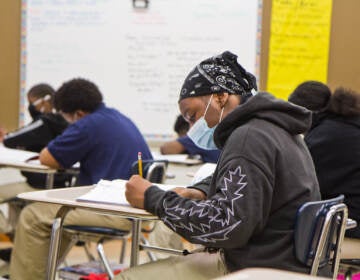Philly schools chief talks tax increases, ‘friends of’ groups, and his own tenure
ListenIn each of the past few years, the Philadelphia School District has asked the city and state governments to provide hundreds of millions of dollars in new revenue.
The district has said that the increased funding would allow it to greatly increase educational outcomes for the city’s children.
In past years, funding requests never came close to being fulfilled. But this year, plans at the city and state level are on the table to nearly fulfill the district’s $309 million ask.
WHYY/NewsWorks’ Kevin McCorry sat down with schools Superintendent William Hite to discuss a wide range of topics, including the prospect of additional revenue, the role of “friends of” groups, and his own long-term plans.
The extended interview can be heard by clicking to the “play” button above.
A few highlights:
NEWSWORKS: You, of course, think that Gov. Wolf’s and Mayor Nutter’s proposed tax increases would translate into great value for the city’s kids, but there are probably many taxpayers in the city and our surrounding counties who are more skeptical. What do you say to someone who doubts that a funding increase would make a difference in Philadelphia classrooms?
HITE: You have to look at what we’ve done. And what we’ve had to do, unfortunately for the past three years, is really around stabilizing the district. We made a commitment to not spend any more than what we have, and that meant we had to make some very hard choices in the district: closing facilities, eliminating 5,000 positions, reducing administrative spending … we even have two concessionary labor contracts.
All of those things were because we’ve taken a very responsible approach to how we spend taxpayer dollars. Our five-year financial plan talks about how these monies, any new monies, any new investments, will then go back into schools and into classrooms. These are not resources that will allow us to regrow our central administration.
NEWSWORKS: Can you say specifically, though, that there will be ‘x’ many more nurses or ‘x’ many new counselors or smaller class sizes?
HITE: We can say some examples. We’re going to come out with more specificity around this in the next week or so, but this could be things like eliminating split classes … It could be having a counselor in every school, five days a week. It could be having a health service or a nurse service in schools everyday.
It is more training and development around how we teach better as an institution. It is instructional materials … It’s cleaning the buildings more regularly, and we’ve talked about attendance really being a focus, and we understand that particularly many of our younger people miss school because of complications with asthma, and that goes directly to the conditions of our buildings …”
“It’s simpler things too: If a child shows advance placement potential, then they have an advance placement course in their high school, regardless of where they go to high school. If a child needs French 3, then that is available in their high school.”
Hite also talked about the prospect of using new revenue to increase workforce compensation.
NEWSWORKS: You mean teacher raises?
HITE: When I talk about compensation, I’m talking about, if in fact there’s an ability to acquire some savings through benefits [reductions in the Philadelphia Federation of Teachers contract], then reinvesting those savings back into the workforce. And those could be in the form of a [compensation] increase, or something else … We don’t know what that will be because we don’t know what the final numbers are, but we know that it is equally important to acknowledge the work of our professionals.”
Hite talked about the need for a student-weighted funding formula at not just the state level, but at the district level as well.
NEWSWORKS: Once the money comes to you and you have the choice to disperse it, are the neediest students in Philadelphia getting more funding from the district?
HITE: Where we have the abilities to do that, we do do that. And we have plans to do that moving forward because we’re also creating a student-weighted funding formula for Philadelphia that will have different weights for children who are learning English, children from circumstances of poverty, children who may be two grades behind in reading, children who may be two grades ahead in reading …
There are work rules associated with that as well. Essentially where the more experienced individuals [who receive higher salaries] have greater ability to select where they go, and select away from where they don’t want to be.”
And Hite had some advice for young families whose children are not yet school aged.
HITE: Visit your neighborhood school right now. And become an active participant in the “friends of” group. We have those popping up everywhere. Because literally where we’re seeing change in neighborhoods with schools … is where we have young individuals who are becoming involved in the development of high-quality programs.”
When asked about his own five-year plan, Hite made a firm commitment to his desire to remain Philadelphia’s superintendent.
HITE: I’ll still be here, indeed. I will still be here. This work is too hard to hand off to someone else. We didn’t do all of the stabilization stuff to just pick up and leave. I’ve made a commitment to Philadelphia. I need to see this commitment through, and as long as there is support for the work that we’re trying to accomplish, then I plan to be here to accomplish that work.”
If Hite remains superintendent through 2020, his eight-year experience at that point would make him Philadelphia’s longest tenured schools chief since Constance E. Clayton oversaw schools from 1982 to 1993.
WHYY is your source for fact-based, in-depth journalism and information. As a nonprofit organization, we rely on financial support from readers like you. Please give today.





